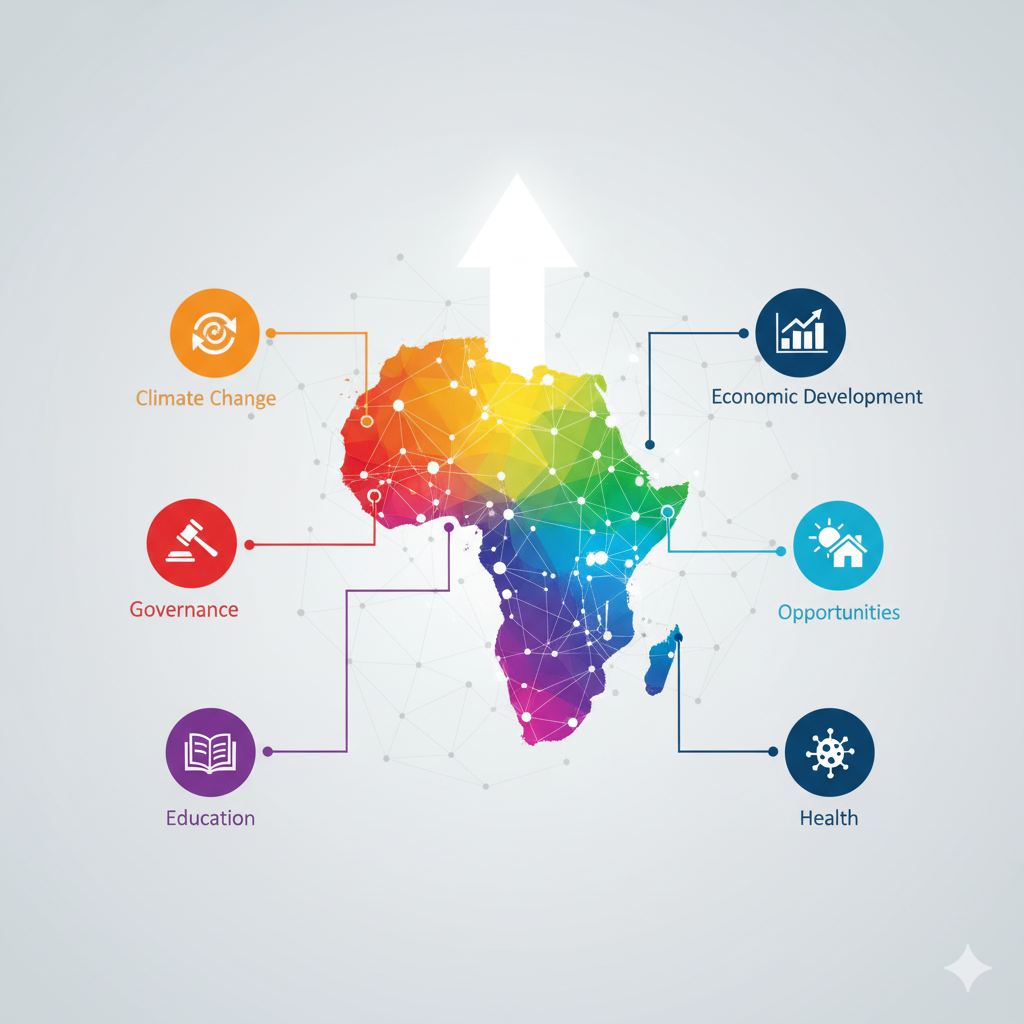Africa stands at the precipice of unprecedented transformation. The narrative is shifting from one of persistent challenges to one of burgeoning opportunities, driven by a talented, youthful population, increased urbanization, and a growing recognition of the continent’s immense economic potential. To fully harness this potential and navigate the development challenges, a paradigm shift in development approach is imperative. The African public/private sector must move beyond fragmented initiatives and embrace “Thinking in Systems,” which recognizes the interconnectedness of various elements for sustainable development paths.
For too long, development efforts in Africa by development partners have been characterized by a sectoral approach, often leading to isolated successes that fail to generate lasting, widespread impact. A new road is needed, one that recognizes Africa’s agency. Consider, for instance, the challenge of food insecurity. A siloed approach focuses solely on increasing agricultural yields through improved seeds or fertilizers. While valuable, this overlooks the systemic factors at play: climate change impacts, storage infrastructure, land tenure issues, access to markets, post-harvest losses, gender dynamics in agriculture, trade issues, and the broader economic policies that either incentivize or disincentivize local food production and distribution. Without addressing these interconnected elements, sustainable food security remains an elusive goal.
The African Agency in Systems Thinking
The power of systems thinking lies not just in its analytical rigor but in its inherent capacity to empower local ownership and agency. It moves beyond the notion of external solutions being “delivered” to Africa and instead fosters an environment where African people, leaders, policymakers, communities, and innovators are the primary architects of their own sustainable futures. This is about recognizing and leveraging the deep, often unacknowledged, systemic knowledge that already exists within African societies. Indigenous knowledge systems, for example, frequently embody principles of ecological balance and interconnectedness that are fundamentally systemic in their nature.
African institutions, from regional economic communities to national planning commissions, are increasingly demonstrating the capacity and will to adopt this comprehensive approach. The African Union’s Agenda 2063, for instance, is a testament to this systemic vision, articulating a holistic framework for a prosperous and peaceful continent, built by Africans for Africans. This strategic foresight recognizes that achieving aspirations like a “transformed economies” or “good governance” requires simultaneous and coordinated action across multiple domains.
The application of systems thinking is yielding tangible results across the continent:
- Climate Resilience and Green Economies: African nations are at the forefront of innovating climate adaptation strategies. Rather than viewing climate change solely as an environmental problem, countries are integrating it into economic planning, urban development, and agricultural policy. For example, initiatives like the Great Green Wall are not just about planting trees; they are complex adaptive systems designed to combat desertification, enhance biodiversity, create sustainable livelihoods, and mitigate conflict, all while bolstering local economies. This integrated approach, championed by African leaders, demonstrates an understanding of the interwoven nature of environmental, social, and economic systems.
- Health Systems Strengthening: The COVID-19 pandemic starkly underscored the need for resilient health systems. Rather than simply acquiring vaccines, many African nations adopted a systemic view, investing in local manufacturing capacity for medical supplies, strengthening community health worker networks, improving data surveillance systems, and integrating public health campaigns with broader social safety nets. This comprehensive response, often developed with limited external resources, showcased remarkable African ingenuity and the power of understanding the health ecosystem as a whole. This can be expanded beyond the emergency period to become a culture.
- Sustainable Urbanization: As Africa urbanizes, cities face immense pressure. A systems approach to urban planning involves looking beyond infrastructure development to consider the interplay of housing, transportation, waste management, energy, social services, and economic opportunities. Cities like Kigali, Rwanda, have adopted integrated urban master plans that prioritize sustainable resource management, green spaces, and efficient public transport, recognizing that these elements are interdependent for creating livable and productive urban environments. This reflects a proactive African vision for sustainable urban futures, rather than reactive problem-solving.
- Digital Transformation: The explosion of digital innovation across Africa is a powerful example of systemic leverage. Beyond simply providing internet access, African innovators and policymakers are building interconnected digital ecosystems that support financial inclusion, e-governance, agricultural extension services, and remote education. Mobile money platforms, for instance, are not just payment systems; they are foundational to broader economic inclusion, supporting micro-enterprises and fostering new business models, demonstrating a sophisticated understanding of how digital tools can transform entire socio-economic systems.
Fostering a Systems Thinking Culture
To further embed systems thinking within Africa’s development agenda, several key areas require concerted effort, driven by African leadership:
- Investing in Local Capacity and Education: Strengthening educational institutions and training programs to equip the next generation of African leaders and practitioners with systems thinking methodologies is paramount. This includes fostering critical thinking, interdisciplinary collaboration, and the ability to map complex relationships.
- Promoting Data Ecosystems and Analytics: Robust and accessible data is the lifeblood of effective systems thinking. Investing in national data infrastructure, promoting data sharing across sectors, and developing local analytical capabilities will enable more informed decision-making and adaptive management.
- Facilitating Cross-Sectoral Collaboration: Breaking down institutional silos and fostering collaboration among government ministries, civil society organizations, the private sector, and research institutions is crucial. Platforms for shared learning and joint problem-solving will accelerate progress.
- Embracing Adaptive Governance: Systems are dynamic and constantly evolving. African governance structures must become more agile, capable of learning from feedback, adapting policies in real-time, and embracing iterative approaches to problem-solving. This includes empowering local communities to participate in design and implementation.
- Championing African Narratives and Solutions: The public and private sectors, and development partners present in African countries, must actively support and amplify African-led initiatives that embody systems thinking. This involves shifting from a donor-driven model to one that facilitates and resources African visions and solutions.
African nations are already demonstrating their agency, their capacity for innovation, and their commitment to building prosperous, resilient, and equitable societies. CDT partners with African countries’ governments as a facilitator and amplifier of the continent’s own systemic wisdom and transformative aspirations. The future of Africa is being built, brick by interconnected brick, through an extensive understanding of its own complex and dynamic systems.







